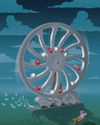Neil Blumenthal is cofounder of WARBY PARKER.. His wife, Rachel, started ROCKETS OF AWESOME. With children ages 4 and 8, they run their home life like a third business. Here’s how it breaks down by the hour.

Gemma, G wait!” Rachel Blumenthal orders the blonde blur that is her 4-year-old daughter with the zoomies. “You have a raspberry smoothie unibrow!” There are leggings and bows and 8-year-old Griffin to get out the door for school. But it’s all good. Breakfast has been accomplished, workouts done, emails answered, lunches packed, assistants coordinated between his company and hers—and now, wipe in hand, a unibrow crisis averted. And it’s only 7:30 at the Blumenthals’.
Neil and Rachel Blumenthal, 38 and 39, met freshman year at Tufts University and married in 2008. By then, she’d already started a jewelry brand, Rachel Leigh. He followed suit in 2010 by cofounding Warby Parker, the industry disruptor that sells trendy prescription eyeglasses for $95 and has grown to nearly 100 stores and 2,000 employees with a valuation, reportedly, of $1.75 billion. Meanwhile, in 2016 she launched Rockets of Awesome, talking to investors while in labor with their second child. With 55 employees and a new investment from Foot Locker, her new brand of children’s clothing is designed exactly for mornings like this.
But while not every entrepreneur can claim the Blumenthals’ level of business successes, many can relate to their real-life scramble outside the office. Being parent-entrepreneurs requires improvisation. Like the time this spring when they were checking in at JFK for a trip to the Bahamas and Neil turned to Rachel and said, “Your passport is expired.” She thought: Surely you don’t know how to read a passport because that would never happen to me. But, yeah: expired. So? Step one, distract the kids at Dunkin’ Donuts; two, google “emergency passport”; and three, reschedule her flight as the others flew off to the Bahamas. “It was Saturday. I got there Monday,” says Rachel. “It was the most peaceful three days of my entire life.”
هذه القصة مأخوذة من طبعة July - August 2019 من Entrepreneur.
ابدأ النسخة التجريبية المجانية من Magzter GOLD لمدة 7 أيام للوصول إلى آلاف القصص المتميزة المنسقة وأكثر من 9,000 مجلة وصحيفة.
بالفعل مشترك ? تسجيل الدخول
هذه القصة مأخوذة من طبعة July - August 2019 من Entrepreneur.
ابدأ النسخة التجريبية المجانية من Magzter GOLD لمدة 7 أيام للوصول إلى آلاف القصص المتميزة المنسقة وأكثر من 9,000 مجلة وصحيفة.
بالفعل مشترك? تسجيل الدخول

How to Succeed With Gen Z Workers
People often say that younger employees are different. But are they? We asked six business leaders what they've learned, and how their teams thrive.

There's No Perfect Answer
I worked the same job for 19 years. I hated it, but it paid the bills. Then, in 2017, I entertained an exciting but terrifying question: Could I be an entrepreneur? I wasn't sure, so I needed something that felt like a guarantee. I searched for signs that would feel like a big, clear \"yes!\" Instead, what I found was a tarot card deck.

10 HOTTEST TRENDS for 2025
Want to buy a brand that buzzes? Here's what to know.

BUILD YOUR MONEY MACHINE
A franchise isn't just a franchise. It should be a Money Machine, creating profit even while you're out of the office. Here's how.

The Top Franchises for Veterans
Are you a military vet looking to become a franchisee, or just want to support a brand that supports the troops? Check out these 150 brands.

20 LEADERS WHO ARE DEFINING ENTREPRENEURSHIP TODAY
In a year of disruption, we wanted to know: Whose work will define the years to come? We reviewed hundreds of names and picked 20 leaders across a range of industries and sizes. Meet them on the following pages, and see what it takes to thrive in 2025 and beyond.

How to Become a Main Street Millionaire
It started when I bought one little laundromat. Now I have a whole portfolio of small local businesses that bring in tens of millions in revenue a year. Here's why following my playbook could be your ticket to financial freedom-and saving America's local small businesses.

Want to Better Serve Your Clients? Become Them.
As a designer for brands, starting my own product company gave me a dose of humilityand it changed the way I relate to clients.

I've Been a Publicist for 17 Years.Don't Hire Me.
Entrepreneurs often think they need PR. Most don't. Here's why you're probably better off not hiring someone like me.

The CEO's Advice to the MVP
Kickstarter CEO Everette Taylor knows the formula for a successful launch. NBA champ Jaylen Brown recently launched a shoe and athleisure brand. They have a lot to teach each other.